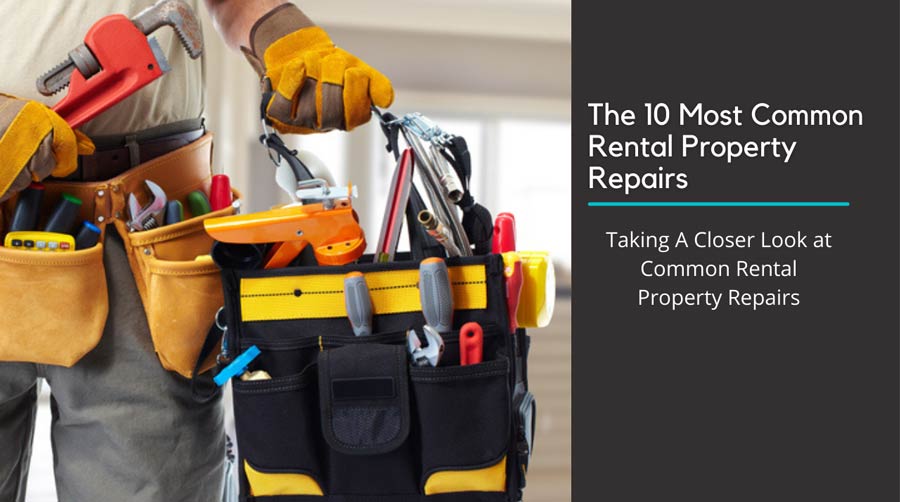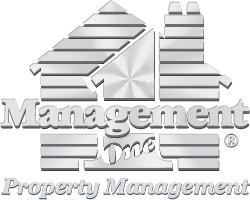
The 10 Most Common Rental Property Repairs
As a property inspector, I receive approximately 20 work orders a day, think about that, that’s about 400ish work orders a month, and Management One has been in business for over 30 years that’s close to 150,000 work orders. So, the information we are about to cover comes from “hands-on” knowledge not just some numbers thrown together by a guy sitting in an office crunching numbers.
The Overview List
This is an overview list of common rental property repairs, which gives way to a much more detailed list below. These items tend to shift throughout the year with the weather. The major exception to this is plumbing. Plumbing is a year-round challenge.
However, the importance of these items also depends, primarily, on the age of the property. For example, the roof is relatively unimportant until it starts leaking, and in most cases, this is not until it is 25, 30 years old, if even then.
The list below is in order, based on a list of 250 items we have had repair calls for recently. These account for percentage values, and in the list below, by number, not really by dollar amount. I'll break down the "how's and whys."
- Miscellaneous (includes smoke detectors, doorknobs, blinds, etc.): 28%
- Fences and Gates: 10%
- Sprinkler systems: 8%
- Plumbing: 7%
- Electrical: 6%
- Heating/HVAC: 5%
- Pest Control: 4%
- Landscaping (trees and such): 4%
- Garage Doors and Openers: 3%
- Appliances: 3%
- Roofing: 2%
Taking A Closer Look at Common Rental Property Repairs
First Place is…
The single most common repair involves plumbing. Hands down, this is an item that just keeps on giving. Yes, I'm being facetious. And yes, I realize that the Plumbing category is at 27% versus 28% for miscellaneous, but plumbing stands alone in sheer volume.
The average plumbing repair runs about $149. This, of course, fluctuates. For example, if there were a vast influx of water heater replacements, that skews the numbers, to be sure. In my sample date, there was a mix of repairs, including a couple of water heater replacements. Also if the property is worth $900,000 the faucet you replace is going to be higher in replacing like for like than a property valued at $300,000
2nd place is...
Miscellaneous. You may think that it is too inclusive, but it really isn't. There are so many items taken out of general repairs, as seen below, that these genuinely are miscellaneous items. Smoke detectors, window screens, doorknobs, blinds, these all figure in. For this reason, if we have multiple items, we try to get them all done with a single contractor
The average miscellaneous invoice runs about $225, and usually, includes two or three items per invoice. By repairing multiple items during one trip to the home, allows us to save you money by avoiding multiple trip charges.
The Bronze goes to...
Fences and gates. Where we are in Southern California, there are a lot of wood fences, and as such, wood gates. This is one of those items that, as they age, will need serious work done. Sunshine, heat, water, all take a toll on wood fencing. And, sadly, treated the wood or not, they will sufferer from wood rot and termite damage. Maybe not today or the first 8 to 10 years, but once they start going bad it's only a matter of time, and one good wind, like a Santa Ana Wind, and these fences and gates are coming down.
A way to mitigate this is to inspect fences regularly and repair them as needed, for as little as possible, but sometimes that just isn't enough. The average fence repair comes in at about $510. That may be a bit high because mixed in with that are two replacements. Although these replacements were smaller in scope than normal, they still add up!
A Sprinkling of Sprinklers
This being the very start of summer, following a heavy rain filled winter, it really comes as no surprise that we have a fair number of sprinkler repairs. As far as common rental property repairs, it is somewhat common for us, because we require our residents to keep their lawns looking sharp. Yet, after a lot of rain, there's a percentage of residents who, to their horror, find that their timers no longer work, or that the timers have lost their settings after having been turned off (or unplugged).
Sprinklers themselves, we avoid repairing. This is an item that is written into the rental agreement that the resident is to replace sprinklers, however, lines, no way. I'd rather residents not be digging down and messing with the water lines.
Electrical Issues: A Shocker!
Okay, maybe not a shocker, the word just made a cuter header. Electrical issues comprise about 6% of calls for service that we receive. And you know what? We really do not want a resident trying to solve any electrical issues beyond resetting breakers and a tripped GFI. A GFI, by the way, is short for Ground Fault Circuit Interrupter. That's those little Test and Reset buttons on some of a home’s outlets, usually in the garage, kitchen, and bathrooms.
Serious electrical issues, shorts, etc., no, those ought to always be handled only by certified professionals as it could void your warranty on your property insurance
Heating and HVAC
The heating and AC, or HVAC system, (heating, ventilating, and air conditioning), is very important and tends to be, by dollar amount, among the leaders. However, it falls to 5% in terms of the number of calls typically received. Yet, when the temps spike or plummet, you can bet the farm that residents will start calling!
Some of the things we do to stave off much of this are we service the HVAC systems during property vacancies. This involves changing the filters (the number one cause of causing an HVAC system to fail), checking the refrigerant levels, checking and replacing weak capacitors and such. This does a couple of things: it reduces the number common rental property repairs to the HVAC system by catching items before they become a problem, it alerts us to future issues which could become problems, and it ensures a new resident starts off on the right foot. Can you imagine moving into a new place and BOOM, no AC? And it's 104 out? Or 33 degrees? That used to happen.
Pest Control is a Four Percenter
Really, that many? Yep. When we rehab a house, if there are signs of bugs or rodents, we immediately order up pest control. If you let the pests get out of control, it is that much harder to reign back in later. However, we also have it in our management agreements that the resident is entitled to one treatment a year at the property owner's expense. Any more than that would be at the resident's expense.
Why do we do that? For the same reason above: if the pests get out of control, the home could lose a resident, and the owner would still be on the hook for it, a much higher bill than treating as we go.
Landscaping
Besides wood rot and water leaks, do you know what else is unhealthy for a house? Trees and bushes are touching the roof and siding. Getting these trimmed back or removed altogether can save a property owner a whole lot of money, so this makes the list of common rental property repairs. Not only that, but regular maintenance will prevent other repairs from needing to be done. Torn screens from a bush? It happens. Broken window due to a tree branch? It happens.
However, there is much more to landscape maintenance than just this. As a matter of fact, this is a topic that can easily be its own article. So, here I'll boil it down a lot.
We assign lawn care to properties once a resident gives notice. This ensures that the property will have excellent curb appeal from the moment it comes on the market. Mowing, edging, seeding, cleaning up, and setting the sprinklers and timer correctly all are included. If trees need trimming, this happens, but that's not the only time.
Each month we check the front exteriors of the houses we manage. We can designate a tree trim at this time, while at the same time, we assess how the yards look. Annually we look at the whole property, in and out, while evaluating all the landscaping too. Many times, we'll make suggestions on the landscaping. Such as removing bushes, adding rock, etc.
Garage Doors and Openers
3% of all calls for service involve garage doors or openers. Again, this is not reflected in dollar amounts per repair, as an opener replacement, or replacing a garage door, can be quite expensive. Catching these items in advance, by checking the opener's action, listening for bad wheels in a sectional garage door, can save money in the long term. However, when bearing in mind that items such as rotary springs are designed with a life span (such as 10,000 cycles of opening and closing), there will be costs to repair when these items, eventually, fail.
Appliances
Appliances also come in at 3 per hundred service requests of common rental property repairs, and these usually involve the range or dishwasher. Of course, this number rises or falls, depending on the age of the items and properties themselves. Also, some property owners supply washers, dryers, refrigerators, however, we highly recommend not leaving these sorts of items in a rental home, because sooner or later, they will break.
Look at it this way: If the house did not come with it when it was built, don't take on the additional liability by leaving it behind.
Roofing
The least frequent rental property repair is roofing, but, by and large, a roofing repair can set you back thousands! I have seen properties (before working with Management One) where the property as a whole is allowed to go to seed, and it starts many times with the roof.
You see, a property owner gets a dose of "My Roof Is Going To Cost What?!?" and, many times, that leads to a morose feeling about the property in general.
Don't. Do. That! Tackle it now, because I can guarantee you that that same repair will be WAY more expensive later.
Summing it Up and Bringing it Home
The cost of upkeep on any given house, be in your primary residence, or a rental property, is important to keep in mind. Many times, it makes financial sense to defer some repairs for a short time. Other times vital repairs come up that need attention, right now. Knowing the difference is critical, however, we do urge you to maintain a separate bank account that that is funded by the rent intake, in whole, or in part, so when that AC replacement bill hits, you're not stuck in a bind trying to come up with the funds needed to repair (or replace) it. A little foresight can make your life so much simpler.
How do you pay for all these repairs??
You have a couple of choices believe it or not. One if you’re like many people who own rental properties, you pay for repairs as they arise out of your personal checking account which presents a couple of challenges. First, you always feel like your rental property is robbing you of the personal things you want to do, and you will forget not to get the tax write and savings you have coming because it’s a hassle to find them.
Or you do what other owners of rental properties do. They open up a separate checking account for repairs, etc. that come with owning a rental property. As rents increase, you will find that your resident is paying for these repairs and rehab repairs when it’s vacant and at tax time all your documents are in place to receive the maximum Tax Savings. Click here to view the article on how to set it up and how it works….

By the way, what is the difference between a repair and an improvement? Check out this article on Apartments.com to find out how the government sees it.


.png)









